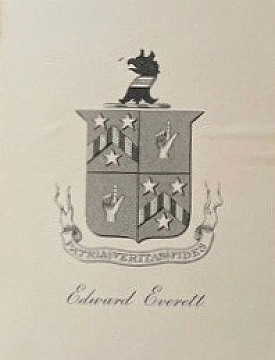Edward Everett (b.1856)
Lawyer, of 16 West Cedar Street, Boston, Massachusetts
He was the grandson and namesake of one of the most distinguished Americans of his era, Edward Everett, and a great-grandson of Peter Chardon Brooks who was reputed to be Boston's first millionaire. Among his first cousins, he included Lady Edith (Russell) Playfair. He graduated from Harvard (1871) and became a lawyer although he was better known as, "an industrious clubman and society favorite".
In 1884, he was married in secret at Brooklyn City Hall in New York to Georgia, the beautiful daughter of William V. Hinman, who with his wife kept house for a pair of physicians at 15 Mount Vernon Street, Boston. For the first four years of their marriage, Everett was anxious to conceal his wife, "fearing the wrath of his proud relatives," so while he maintained his carefree existence in Boston, she was kept in a flat in Brooklyn where she supported herself as a seamstress, waiting for the day when she could move to Boston and be publicly recognized as his wife. That day never came.
In 1888, Everett told her that in order for them to be wed in a church as his mother would want, they must first have their marriage annulled. She agreed and although they were no longer man and wife, their affair continued until 1891 during which time he kept her hopes alive with a series of love letters: "Teddy is so lonely and forlorn without his love close by" read one, while another confided, "Dear wifey, do not worry and be so blue, my sweetheart, because hubs is close by and loves his dear baby and wants to see her very much. I should have come over to see you today, but I could not. Do not worry sweetest girl, I love you so much." That June, Everett at last told Georgia that the time had come for them to be properly married and he told her to pack her bags and meet him in Hartford. But the groom-to-be never showed up, and a few days later she learned from the papers that Edward Everett had left for Europe. It was then that her love turned to hate.
In 1892, Georgia succeeded in having the annulment repealed by one judge, only then to have a bench of judges restore the annulment just months later. In 1895 (by which time she was working in a millinery factory on Summer Street, Boston, while living with her father and sister on Saunders Street in Brighton), she took her case to the Supreme Court in New York. Despite Everett's best attempts to besmirch her character while bringing into question the validity of their marriage (refer to Georgia's biography here), at the conclusion of their sensational trial Georgia won the right to be called Mrs Edward Everett and was granted a decree of separate maintenance. While the name of the great statesman Edward Everett is still remembered and enshrined in glory today, the name of his grandson and namesake was disgraced and has long since passed into obscurity.
In 1884, he was married in secret at Brooklyn City Hall in New York to Georgia, the beautiful daughter of William V. Hinman, who with his wife kept house for a pair of physicians at 15 Mount Vernon Street, Boston. For the first four years of their marriage, Everett was anxious to conceal his wife, "fearing the wrath of his proud relatives," so while he maintained his carefree existence in Boston, she was kept in a flat in Brooklyn where she supported herself as a seamstress, waiting for the day when she could move to Boston and be publicly recognized as his wife. That day never came.
In 1888, Everett told her that in order for them to be wed in a church as his mother would want, they must first have their marriage annulled. She agreed and although they were no longer man and wife, their affair continued until 1891 during which time he kept her hopes alive with a series of love letters: "Teddy is so lonely and forlorn without his love close by" read one, while another confided, "Dear wifey, do not worry and be so blue, my sweetheart, because hubs is close by and loves his dear baby and wants to see her very much. I should have come over to see you today, but I could not. Do not worry sweetest girl, I love you so much." That June, Everett at last told Georgia that the time had come for them to be properly married and he told her to pack her bags and meet him in Hartford. But the groom-to-be never showed up, and a few days later she learned from the papers that Edward Everett had left for Europe. It was then that her love turned to hate.
In 1892, Georgia succeeded in having the annulment repealed by one judge, only then to have a bench of judges restore the annulment just months later. In 1895 (by which time she was working in a millinery factory on Summer Street, Boston, while living with her father and sister on Saunders Street in Brighton), she took her case to the Supreme Court in New York. Despite Everett's best attempts to besmirch her character while bringing into question the validity of their marriage (refer to Georgia's biography here), at the conclusion of their sensational trial Georgia won the right to be called Mrs Edward Everett and was granted a decree of separate maintenance. While the name of the great statesman Edward Everett is still remembered and enshrined in glory today, the name of his grandson and namesake was disgraced and has long since passed into obscurity.
Parents (2)
Categories
Share
Mrs Edward Everett's Sixteen Year Fight for a Name (February 7, 1904) St. Louis Post-Dispatch; and, Edward Everett's Marriage - Story of the Grandson of the Great Statesman and the Janitor's Daughter (April 14, 1895) Boston Sunday Post.


